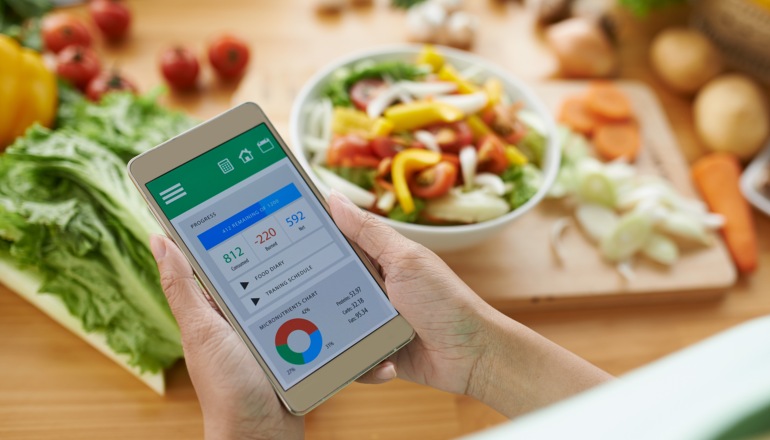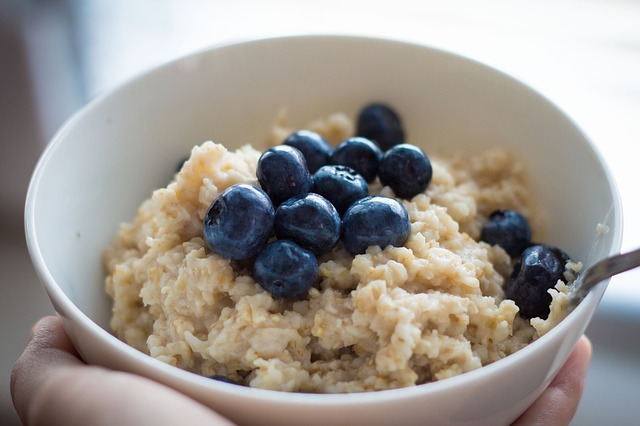
Have you ever counted calories before? Beyond counting calories, many people also count their “macros” (grams of protein, fat, and carbohydrate). If you’ve been on the Internet for more than ten minutes, you’ve probably come across somebody talking about their calories or macros.
When I was studying to be a dietitian, I counted lots of things. In some instances, such as when a person has a medical condition, this counting is important. Things like tube feeding, kidney problems, and diabetes may require you and your medical team to pay attention to amounts of certain nutrients.
But, for this discussion, I want to focus on general health — and if counting anything is worth the effort.
As I share my experiences, I’ll break down the pros and cons of counting calories and macros. I will also discuss how your specific personality and possible goals relate to the importance of tracking certain things.
Let’s Start with Some Nutrition Basics
Calories are just a way of measuring how much energy our food gives us. To lose weight, you must burn more energy than you take in. Carbohydrate, protein, and fat give us calories.

Some believe the ratio of carbs, fat, and protein makes a difference in weight loss or muscle gain. While that is true, the reasons behind it are a big point of confusion. Carbs and fat often get blamed for weight gain. Protein usually avoids criticism and is credited with gaining muscle and staying lean.
The truth is, you need a balance of the three macros. That optimal balance can differ between individuals due to genetic reasons as well as environment and activity levels. Protein, fat, and carbs all have different benefits, and when we consume one more than the other, it obviously shifts the ratios and the potential benefits.
Our feeling of hunger and fullness can depend on what we consume. Protein, carbs, and fats all contribute to these feelings, and that differs for each of us. If you ate nothing but carbs, your protein would be lacking, and it would be difficult to stay full, and build muscle, among other drawbacks. The same goes for too much fat or protein.
If a balance between all the macronutrients is needed, shouldn’t we count them to make sure we’re doing it right? The short answer for most of us is: no. I’ll start with all the reasons why counting macros may not be a good idea.
Reason #1: Failing at Math
When it comes to calculating our food, we humans aren’t good at being accurate. Many steps of the process cause a high error rate. For example, trying to get the nutrient content of a chicken breast:
- Even if you measure it with a scale, every cut of meat is slightly different in terms of how fatty it may be. So, you may be off a few calories and grams of protein just from that variability.
- Second, when you look up how many calories and protein is in x amount of chicken, there will be an error rate because those numbers are an average of similar pieces of chicken.
So, yes, we can “count” that chicken, but doing so may not be very accurate.

Reason #2: Fond Memories
When you think back to great food moments, do you think about how many calories you consumed? Birthday dinners, holiday traditions, the best restaurant you went to on vacation—you ate at least 100 grams of protein at all those times, right?
Food is almost always involved in our daily experiences. Sharing meals with good company, in cool places, and with flavors that you come up with is a fun experience. When we are sad, we have food rituals. Same goes for when we are happy.
If you are hungry at this moment, think about one of those weddings you attended with stacks of food everywhere. Food is tied to our social life, emotions, and memories. Putting numbers to it can take the soul out of our food. It becomes a numbers game and it is easy to go overboard worrying about it.
Reason #3: Food Quality
In reading about nutrition online, you may come across the acronym “IIFYM,” which stands for “if it fits your macros.” IIFYM is a popular saying, especially as an excuse for eating poor quality food.
When we pay too much attention to numbers, it becomes easy to slack on the quality of our food. You can make your numbers look “good” with some bars and a Big Mac, but is that really in the spirit of what you’re after? The calories and macros may resemble a good balance, but the quality is lacking.

3 Reasons for Counting Calories and/or Macros
I just went over several reasons why I wouldn’t recommend measuring your food and counting calories and/or macros. There are, however, certain potential advantages to taking this approach.
Reason #1: Shedding Light on Your Eating Habits
When done with an open mind, tracking your nutrient numbers can be educational. You may learn what carbohydrate sources are, how to get enough protein for your weight, and how to eat the right amount of fat with each meal. Perhaps you didn’t realize things like coffee creamers and little pieces of candy really do add up.
If you are lost about what a balanced meal looks like, sometimes looking at the data can help. In general, a diet full of vegetables, fruit, protein, and natural starches is just fine in terms of being balanced. However, during travel or busy times, tracking nutrients can come in handy. This is especially true if you have to rely on bars and packaged foods on airplanes or trips.
Reason #2: Providing Yourself with Accuracy and Accountability
For some people, tracking their food intake adds a level of accountability and knowledge that can help them make proper changes. Entering what you eat into your food diary each day can help keep you honest. Humans are good at forgetting what we eat and underreporting our intake. As I discussed in a previous article, I believe pictures are more powerful than words or numbers, but any level of tracking helps.
If you go the route of tracking your numbers, at the end of each week, look back and average out your numbers for the week. This will help you make objective decisions about what changes you may want to make from the big-picture perspective.
Reason #3: Gaining an Understanding of Your Portions
Learning about calories can also help you learn about portion control. Many of us tend to serve ourselves bigger portions than we need, so bringing things back down occasionally is important. While you certainly can learn about portion control in other ways, many people clean things up in a hurry once they see the concrete numbers.
Personally, I’ve seen the strategy of counting calories work quite rarely. Most of the success I’ve seen has involved people with already low body fat who were trying to get leaner. In other words, calorie counting as a strategy may be more appropriate for advanced goals.
That said, if you are new to cooking at home, learning proper portions can be helpful. Do you know what 6 ounces of fish actually looks like? Or a half cup of oatmeal? It may be wise to occasionally measure things out to train your eye. This is especially important with calorie-dense foods like nut butters and oils.

Is Counting Calories and/or Macros Right for You?
By far, I believe most of us shouldn’t worry about our exact calories or macros, but let’s take another look at it from the angle of different personalities and goals.
You might not want to count if:
- You’ve done it before and were told to be on a 1200-calorie diet
- That 1200-calorie diet inevitably made you miserable and led to a poor relationship with food
- You are the type that could potentially obsess over the numbers and be stressed
- The idea of math hurts (I raise both my hands)
- Your goal is to be healthy, happy, and live a long active life, not to be a fitness model
- You have history or family history of disordered eating
- You eat or plan to start eating a diet high in fruits, veggies, lean proteins, and whole grains (eating these things tend to lead to appropriate ratios of macros and calories naturally)
You might be a counter if (in my best Jeff Foxworthy voice):
- You have competitive physique goals, such as figure and bodybuilding
- Your doctor asked you to track certain things for a medical reason
- The idea of counting excites you
- You think you can handle doing it periodically to tune your knowledge and check where you stand with your diet habits
Counting calories and macros certainly isn’t for everyone. Most of the people I work with, even competitive athletes, do not track specific numbers. Instead, if we are trying to add or gain weight, we eat a little less or more until the scale begins to move. If we decide to eat less, and are hungry all the time, we adjust our food choices to help mitigate the hunger. An example here would be eating enough protein rich foods to help us stay full.
In this manner, we don’t know exactly the number — but we do know our approach is working. The proof is in the pudding.



































